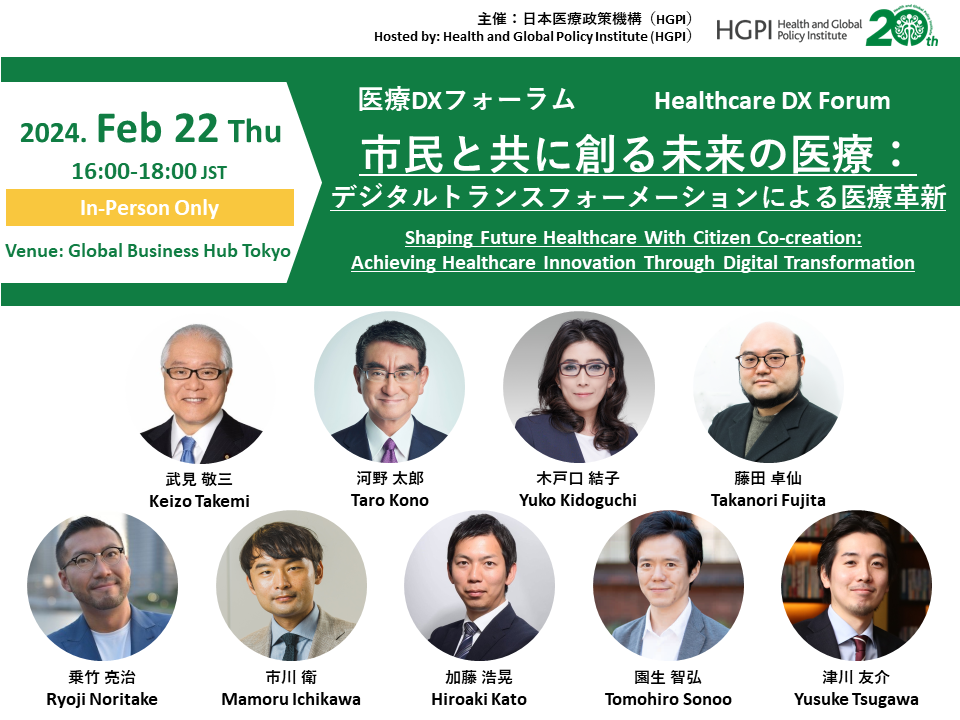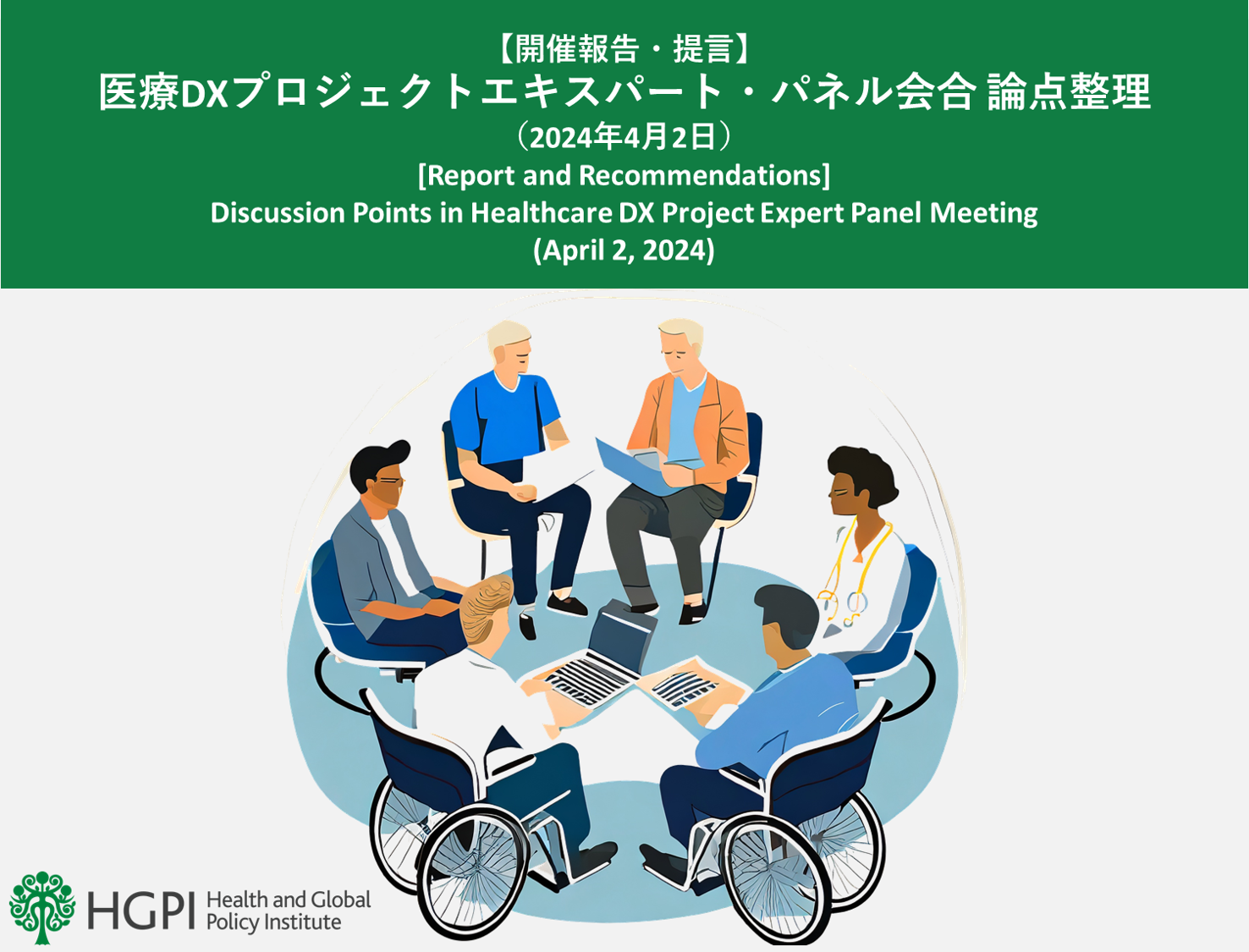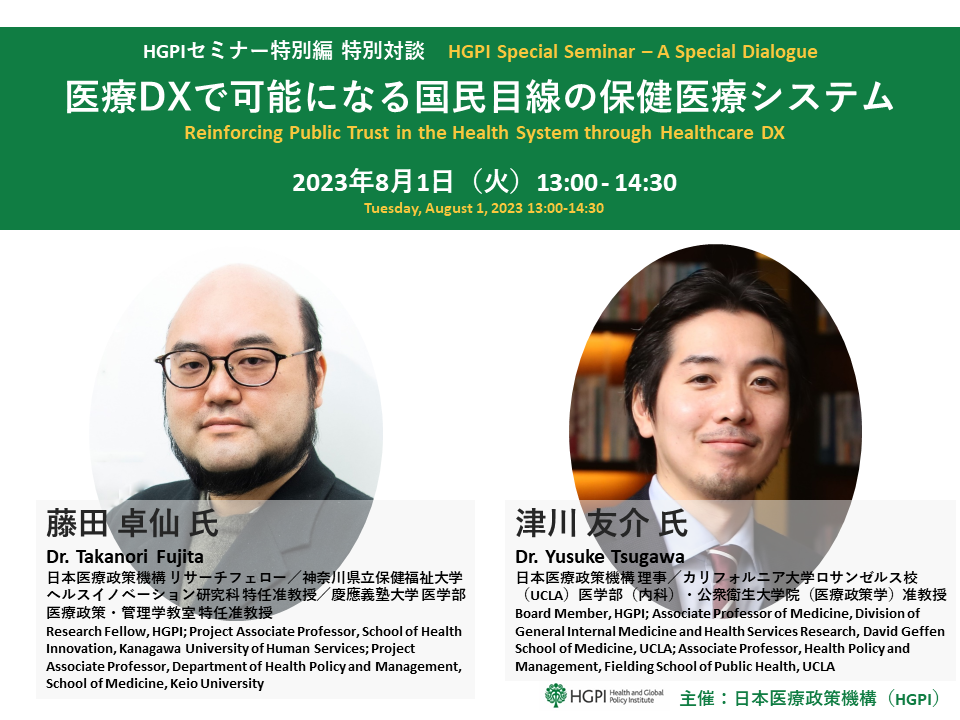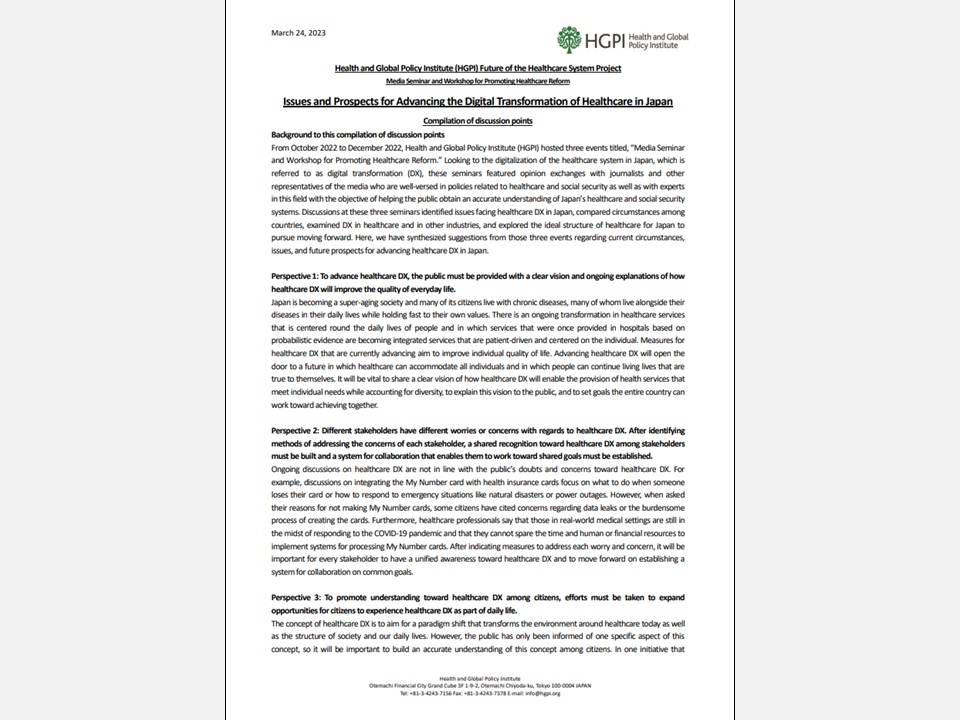[Research Report] Healthcare DX Project Research Report of Interviews ”Expectations for the Coming Era of Healthcare DX from People Living with Health Concerns” (June 10, 2024)
date : 6/10/2024
![[Research Report] Healthcare DX Project Research Report of Interviews ”Expectations for the Coming Era of Healthcare DX from People Living with Health Concerns” (June 10, 2024)](https://hgpi.org/en/wp-content/uploads/sites/2/dx-20240610-top.png)
Health and Global Policy Institute (HGPI) has conducted and compiled a survey of patients and related parties interviewed about healthcare DX in order to examine health care systems that benefit the public. This report focuses on the daily issues, and concerns expressed by the respondents. By clarifying their expectations and concerns about healthcare DX based on these issues, the survey aims to promote appropriate countermeasures and enrich the lives of the parties involved.
“Expectations for the Coming Era of Healthcare DX from People Living with Health Concerns”
INDEX
―――――――――――――――――――――
[Summary of the nine interview participants]
Living in Society as an Affected Party and Healthcare DX
[Cases by disease]
Person living with MCI
Person living with a rare form of cancer
Person living with type 1 diabetes
Person living with a mental health condition
Person who has experienced an aortic dissection and stroke
Person living with lung cancer
Person living with chronic obstructive pulmonary disease (COPD)
Person living with chronic kidney disease (CKD)
Person raising a child who lives with an intractable disease
―――――――――――――――――――――
<The experience of participants and their expectations for healthcare DX>
Immediately after the development of the condition or changes that occurred in their families, participants experienced difficulties in self-understanding and self-determination, and felt the need for sufficient knowledge and capacity for independent decision-making regarding treatments or daily living. Furthermore, regardless of treatments or cures for their condition, all participants based their thinking on daily life. This suggests that what will be important in the coming era will be forging connections between the foundation of daily life and healthcare, and transforming the healthcare experience in ways that further facilitate communication and make more efficient use of time. Participants also felt that the development of diseases placed restrictions on their daily lives and they expressed high expectations for healthcare DX to help address such challenges.
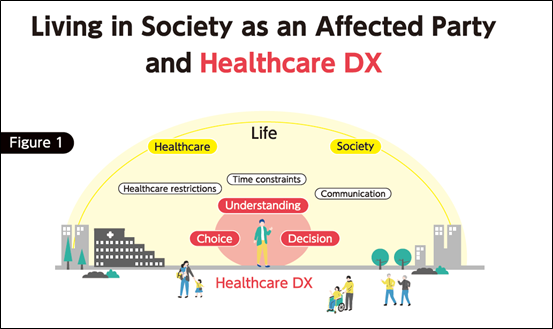
<Summary of Affected parties feel uneasy about healthcare DX>
Nine interview participants were concerned that the digitization and sharing of information could have a negative impact on them or their families. In addition, participants had the strong impression that the Government is leading the way in healthcare DX. They were also highly conscious of past mistakes related to healthcare DX and were concerned about Government involvement in the data management that accompanies digitalization. Furthermore, we observed that users may be concerned toward DX and the public may be reluctant to participate in it due to a perceived lack of benefits from DX or from the secondary use of data, which is one characteristic of DX.
<Future application of survey results>
For those who are promoting healthcare DX, this survey report provides a realistic view of the current status of healthcare DX from the perspective of participants. HGPI hopes that, in future promotion of healthcare DX, the current situation, expectations, and concerns of those involved will be fully considered through dialogue with patients and those involved.
<Voces of Participants>
Person living with MCI (Mr. D|60s|lives in Nara Prefecture)

Keeping a wearable device on you at all times allows you to (objectively) confirm if there is a problem, immediately … They help me detect problems early and take appropriate countermeasures … Doctors can also use the data to diagnose people and give them appropriate advice (based on their daily lives) …Wearable devices can be invaluable tools for daily life and health management.”
Person living with a rare form of cancer (Mr. E|40s|lives in Osaka Prefecture)

I think we need healthcare DX to promote digitalization, to streamline healthcare, and to improve accessibility. However, I also believe it will be essential for generating new values from the perspective of defining what happiness means to each stakeholder. To achieve various forms of wellbeing, I think we should make the most of data and continuously move forward with DX.
Person living with type 1 diabetes (Mr. H|50s|lives in Kanagawa Prefecture)

For example, if I were out in the city and collapsed due to hypoglycemia, if I have the My Number card, paramedics might be able to use it to quickly refer me to a hospital … My medical information would be provided instantly, providing doctors with details like my history of diabetes treatment that would alert them to the possibility of hypoglycemia. If information is provided in real time, it will become possible to provide accurate diagnoses and treatment, and make streamlined healthcare DX a reality … Integrated platforms must be established so people can be provided with seamless healthcare experiences.
Person living with a mental health condition (Mr. A|40s|lives in Tokyo)

It is important for patients and physicians to share information and make treatment decisions together to ensure smooth decision-making for patients. However, current circumstances hinder efforts from patients to actively communicate with their physicians and need to be improved. It is still unclear how beneficial digitalization will be for automatically gathering, storing, and sharing data on daily life, but I think it will facilitate communication among patients and physicians.
Person who has experienced an aortic dissection and stroke (Mr. B|60s|lives in Tokyo)

I think healthcare is a very broad topic. After all, receiving treatment in a hospital and receiving treatment over the course of daily life are both healthcare. I do not see daily life and healthcare as separate; rather, I think they are closely related. This is because once someone completes treatment at a hospital, they then return to their daily lives at home. I think we need continuity, so we must not think of them as separate. I think the gaps between the two will narrow if digitalization advances, even a little. They may even become seamless.
Person living with lung cancer (Mr. C|50s|lives in Kanagawa Prefecture)

I think the best direction to set for healthcare DX is to try to create a recommendation system that accurately provides the information people need, when they need it. I think it would be good if it could predict where I (or another patient) might get lost and provide advice ahead of time. While some say patient literacy must be improved, I think there may be no need for them to do so if it becomes possible to provide precise support through healthcare DX. As data accumulates, it could lead to a world in which people can use healthcare even if they do not improve their literacy.
Person living with chronic obstructive pulmonary disease (COPD) (Mr. F|60s|lives in Tokyo)

I feel many restrictions on my activities if I am hospitalized. … I have to attach a cable every time I use a new machine, such as when I am being tested … We can now charge smartphones wirelessly by simply setting them on a table. If some medical devices also become wireless … daily life would be much more convenient. I mean for the system itself, as well, and I think that is what healthcare DX means.
Person living with chronic kidney disease (CKD) (Ms. G|50s|lives in Fukuoka Prefecture)

For example, if test results could be taken daily using digital tools that … only require placing a sensor on your hand to get a reading, decision-making criteria (for daily life) would gradually take form. It would be nice if testing could be performed in a day or two rather than being something two months in the future, during which the patient might strain themselves the entire time or overlook something they should have kept in mind. If that were to happen, it might help me be able to explain things I cannot put into words now, such as my feelings of fatigue. I think that determining the standards (for healthy behavior in daily life, such as for diet or exercise) for today using the ones from yesterday—or having the ability to do so—is extremely important.
Person raising a child who lives with an intractable disease (Mr. I|50s|lives in Saitama Prefecture)

In places like real-world healthcare settings, people often have to undergo various examinations or procedures. When a person with a disability needs to have a document written or collect a document to submit to a government office, they have to go out of their way to visit a hospital for an examination for that document. On top of that, they have to pay the document fee out-of-pocket and submit it on their own. (As healthcare DX is said to be connected to many things) it would be good if healthcare DX could improve on aspects like that.
Top Research & Recommendations Posts
- [Policy Recommendations] The Path to a Sustainable Healthcare System: Three Key Objectives for Public Deliberation (January 22, 2026)
- [Research Report] The 2025 Public Opinion Survey on Healthcare in Japan (March 17, 2025)
- [Research Report] Perceptions, Knowledge, Actions and Perspectives of Healthcare Organizations in Japan in Relation to Climate Change and Health: A Cross-Sectional Study (November 13, 2025)
- [Research Report] The 2023 Public Opinion Survey on Satisfaction in Healthcare in Japan and Healthcare Applications of Generative AI (January 11, 2024)
- [Policy Recommendations] Reshaping Japan’s Immunization Policy for Life Course Coverage and Vaccine Equity: Challenges and Prospects for an Era of Prevention and Health Promotion (April 25, 2025)
- [Policy Recommendations] Developing a National Health and Climate Strategy for Japan (June 26, 2024)
- [Policy Recommendations] Achieving Equity in Multidisciplinary Pain Treatment and Support Systems for Pain Management (March 31, 2023)
- [Public Comment Submission] “Assessment Report on Climate Change Impacts in Japan (Draft Overview)” (December 24, 2025)
- [Research Report] The Public Opinion Survey on Child-Rearing in Modern Japan (Final Report) (March 4, 2022)
- [Research Report] Survey of Japanese Physicians Regarding Climate Change and Health (December 3, 2023)
Featured Posts
-
2026-01-09
[Registration Open] (Hybrid Format) Dementia Project FY2025 Initiative Concluding Symposium “The Future of Dementia Policy Surrounding Families and Others Who Care for People with Dementia” (March 9, 2026)
![[Registration Open] (Hybrid Format) Dementia Project FY2025 Initiative Concluding Symposium “The Future of Dementia Policy Surrounding Families and Others Who Care for People with Dementia” (March 9, 2026)](https://hgpi.org/en/wp-content/uploads/sites/2/dementia-20260309-top.png)
-
2026-02-05
[Registration Open] (Webinar) The 141st HGPI Seminar “Current Status and Future Prospects of Korea’s Obesity Policy: Voices of People with Lived Experience in Policy Promotion” (March 3, 2026)
![[Registration Open] (Webinar) The 141st HGPI Seminar “Current Status and Future Prospects of Korea’s Obesity Policy: Voices of People with Lived Experience in Policy Promotion” (March 3, 2026)](https://hgpi.org/en/wp-content/uploads/sites/2/hs141-top-1.png)
-
2026-02-06
[Research Report] AMR Policy Update #5: Cancer Care and AMR (Part 2)
![[Research Report] AMR Policy Update #5: Cancer Care and AMR (Part 2)](https://hgpi.org/en/wp-content/uploads/sites/2/HGPI_20260204_AMR-Policy-Update-5.png)




